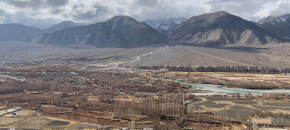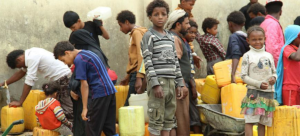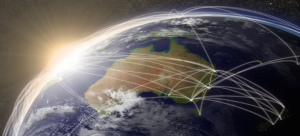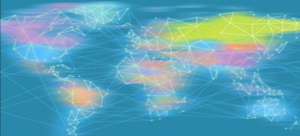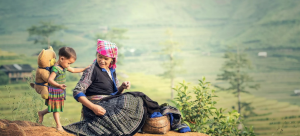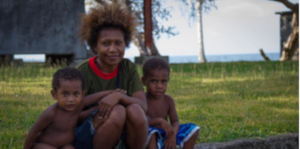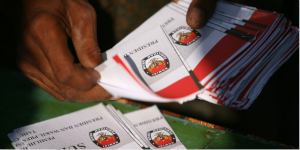Podcasts
Lurching Toward Normalcy: Insurrection, Inauguration, Impeachment with Professor Gordon Flake
Recorded on the 25th of February
While we were watching the insurgency on Capitol Hill, the result of Georgia’s runoff election turned that historically red state blue. With Democrat majorities in both houses of Congress, President Biden can pursue aggressive policies on carbon emissions. That alone has major implications for politics in Australia and the way we live. What else?
But how durable are the Democrat majorities? The vote against impeachment shows that Donald Trump still exerts great influence over the Republican Party. And just moments after the impeachment failed, Trump declared that his movement “to Make America Great Again has only just begun”. For the next two years, the political battles in the US most relevant to Australia will be fought between moderate and progressive Democrats. But what will the Republican Party look like when it will be contesting seats in Congress two years from now?
AIIA WA Christmas Event with the Hon. Professor Stephen Smith
Recorded on the 10th of December
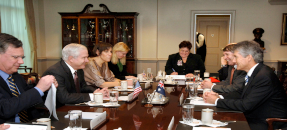 Australia’s security since the end of WW2 has been underpinned by the alliance with the US. By the end of the Cold War the US was a hyperpower, presiding over a world where rules based order, economic globalisation, and democracy were widely held norms. “That America and that world”, writes Hugh White, “is gone forever”.
Australia’s security since the end of WW2 has been underpinned by the alliance with the US. By the end of the Cold War the US was a hyperpower, presiding over a world where rules based order, economic globalisation, and democracy were widely held norms. “That America and that world”, writes Hugh White, “is gone forever”.
Even if Joe Biden is fully committed to restoring US hegemony in the Indo-Pacific, his immediate attention will likely be focussed on healing a divided country and containing Covid-19. He may also face an uncooperative and activist Senate bent on following the isolationist tendencies of President Trump. As a former Minister of Foreign Affairs, and a former Minister of Defence, Professor Stephen Smith is uniquely placed to understand what a Biden administration may mean for the Australia-US Alliance and the Indo Pacific.
Panel Discussion: Australian Trade after Covid-19
Recorded on the 25th of November
 Australia is facing its worst trade outlook since the Great Depression. Covid-19 has caused a global economic recession. Lockdowns all over the world have constrained shipping and manufacturing. Global supply chains have been severely disrupted and will likely remain so for the foreseeable future. In the midst of this, China is blocking billions of dollars’ worth of imports from Australia in a move that many observers view as a retaliation to Australian policy.
Australia is facing its worst trade outlook since the Great Depression. Covid-19 has caused a global economic recession. Lockdowns all over the world have constrained shipping and manufacturing. Global supply chains have been severely disrupted and will likely remain so for the foreseeable future. In the midst of this, China is blocking billions of dollars’ worth of imports from Australia in a move that many observers view as a retaliation to Australian policy.
At our November event Madeleine King MP, Dr Jeffrey Wilson, and Darryl Daisley discussed Australia’s current trade outlook, the problems Australian exporters are facing, and what can be done about them.
US Presidential Election 2020
Recorded on the 28th of October
 At our October event, two prominent Americans living in Perth with an intimate knowledge of the US political system, Professor Gordon Flake and Robin McClellan, shared their insights into the coming election and what either outcome may have meant for the US, Australia, and the rest of the world.
At our October event, two prominent Americans living in Perth with an intimate knowledge of the US political system, Professor Gordon Flake and Robin McClellan, shared their insights into the coming election and what either outcome may have meant for the US, Australia, and the rest of the world.
Not Always Diplomatic: An Australian Woman’s Journey through international affairs
Recorded on the 24th of September
 This podcast is a recording of the launch of Not Always Diplomatic: An Australian Woman’s Journey through international affairs, a book by Dr Sue Boyd. It was launched at The University Club of Western Australia Auditorium by the Official Visitor of the Australian Institute of International Affairs for WA, The Governor, The Hon Kim Beazley AC. His speech starts at 3 minutes 45 seconds. There is also a foreword by the Publishing Manager of UWA Press, Kate Pickard, starting at 21 minutes and 20 seconds. Sue Boyd’s presentation starts at 24 minutes and 20 seconds
This podcast is a recording of the launch of Not Always Diplomatic: An Australian Woman’s Journey through international affairs, a book by Dr Sue Boyd. It was launched at The University Club of Western Australia Auditorium by the Official Visitor of the Australian Institute of International Affairs for WA, The Governor, The Hon Kim Beazley AC. His speech starts at 3 minutes 45 seconds. There is also a foreword by the Publishing Manager of UWA Press, Kate Pickard, starting at 21 minutes and 20 seconds. Sue Boyd’s presentation starts at 24 minutes and 20 seconds
Not Always Diplomatic chronicles the life of a pioneer in international diplomacy and a career that has spanned the globe. Sue Boyd has been the head of Australian diplomatic missions in Fiji, Hong Kong, Vietnam and Bangladesh. She also had postings at the United Nations in New York and in the former East Germany. Sue Boyd has a story to tell from almost everywhere.
She shares this account of her life from her formative years in India, Germany, Ireland, Egypt, Cyprus and Britain through to her years at The University of Western Australia, where she was the first woman to become president of the student guild, beating, among others, Kim Beazley. She then explores her life as a high-flying official firmly ensconced in the ever-changing diplomatic landscape of the 80’s and 90’s, sharing with us her view of the practice of foreign relations, as seen from the trenches.
“An engaging account of life at the coalface by one of Australia’s most active and effective diplomats – and real pathfinder in leading our diplomatic establishment out of its sexist dark age” Gareth Evans, Foreign Minister 1988-96
The India-China conflict in the Himalaya: Cultures, Ecologies, Geopolitics
Recorded on the 26th of August
The recent violent clashes between India and China in Ladakh drew the world’s attention to a decades-old frozen conflict that is often neglected. The possibility of violent conflict though, is only one challenge facing the Himalayan region. In this presentation, Dr Alexander E Davis argues that the slow violence inflicted by state building and militarisation, intimately connected to geopolitical tensions, is the primary challenge facing the region and threatens its ecologies, cultures and languages. The Himalaya is home to three biodiversity hotspots and a mosaic of ethnic groups, many of whom speak threatened languages. Its ice-deposits feed most of Asia’s large rivers. In recent years, India and China have pursued large-scale infrastructure development in the region, to enable greater militarisation, resource extraction, and tourism. The region’s complexity is rarely matched by international relations scholarship, which is overwhelmingly focused on the possibility of violent conflict between state actors. Drawing on historical research and pre-Covid fieldwork in Ladakh in India, this talk will look at the other side of the India-China clash in the Himalaya: the interconnections between ecology, culture and geopolitics in the region
Academic Power Is Moving East
Recorded on the 22nd of July
The 21st Century is frequently forecast to be the Asian Century. The term is usually understood with reference to the rapid growth of the economies of China and India, and the increasing influence it affords them in international affairs.
What is less salient to many is the growing academic power of Asia. At our July event, Tayyeb Shah will explore academic relations between Australia and Asia. Tayyeb will also discuss the potential consequences of the COVID19 virus for the Australian tertiary education sector and possible responses to them.
The politics of pandemics: COVID19 and the international order
Recorded on the 2nd of April
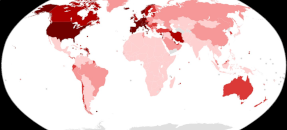 Professor Mark Beeson will discuss how the rapid spread of the coronavirus COVID19 is bringing about an equally rapid transformation in domestic and international politics. The preparedness of national health systems and the responses of political leaders around the world are being thrown into sharp and often unflattering relief.
Professor Mark Beeson will discuss how the rapid spread of the coronavirus COVID19 is bringing about an equally rapid transformation in domestic and international politics. The preparedness of national health systems and the responses of political leaders around the world are being thrown into sharp and often unflattering relief.
The absence of leadership from United States at either the domestic or especially the international level is especially noteworthy. China’s response, by contrast, has – after a false start – been remarkably effective. This presentation considers what the crisis may mean for the relative standing of American and Chinese forms of politics and economics. Are democracies capable of responding to the challenge? What are the implications for free market capitalism as it succumbs to yet another crisis? We may not know the answers for a while, but the questions are increasingly urgent.
Back from the Barracks: Why Indonesia’s Military Still Reigns Supreme
Recorded on the 26th of February
 This presentation by Natalie Sambhi takes a socio-cultural look at why Indonesia wants, and might need, a politically active military. For twenty years, democracy in Indonesia saw the formal exit of the military from politics, the end of its independent business interests, and its nominal return to barracks. Despite those developments, and the need for further reform and professionalisation, it appears that under President Joko Widodo, the Indonesian military is again becoming influential in politics, society, and economics. Jokowi has surrounded himself with former army generals as key cabinet ministers, power brokers, and close advisors.
This presentation by Natalie Sambhi takes a socio-cultural look at why Indonesia wants, and might need, a politically active military. For twenty years, democracy in Indonesia saw the formal exit of the military from politics, the end of its independent business interests, and its nominal return to barracks. Despite those developments, and the need for further reform and professionalisation, it appears that under President Joko Widodo, the Indonesian military is again becoming influential in politics, society, and economics. Jokowi has surrounded himself with former army generals as key cabinet ministers, power brokers, and close advisors.
What explains the enduring role and influence of the armed forces in contemporary Indonesia? What is the impact of current civil-military relations on Jokowi’s second term agenda, particularly on maritime security? With an imbalance of power and unresolved issues from the past, how can Indonesia make the most of its military’s capacity and influence in the face of pressing traditional and non traditional security issues?
Crisis in Yemen
Recorded on the 27th of November
The war in Yemen has been raging for more than 4 years with catastrophic outcomes for its people. Out of a population of 28 million, 24 million are in need of humanitarian assistance. Fifteen million of them are on the brink of famine. Vital infrastructure in Yemen has been destroyed and its people are suffering the worst outbreak of cholera in history. This is the world’s largest humanitarian disaster, yet there is hardly any international news coverage.
Melissa Parke is a member of the UN Group of Eminent Experts on Yemen. At our November meeting, Melissa talked about how what began as a civil war, has broadened into a regional conflict involving powerful states. She discusses the parties involved and their responsibility for human rights violations according to the UN Human Rights Council, as well as the responsibility of states that are supplying weapons and other assistance to parties to the conflict.
To see the video that was played at the start of this presentation click here
The read the Report of the detailed findings of the Group of Eminent International and Regional Experts on Yemen, click here
Defending the Maritime Rules-Based Order: Perspectives from the Indo-Pacific
Recorded on the 23rd of October
Maritime disputes are multifaceted. They include overlapping claims of sovereignty and jurisdiction, contests over freedom of navigation, island-building and militarization, and the use of ‘grey zone’ tactics to harass, intimidate and advance strategic interests. Maritime disputes have become highly visible microcosms of broader discord between the US-led regional security order, and challenger conceptions of order that see a bigger role for rising powers in generating new rules and alternative interpretations of existing international law. In this presentation Dr Bec Strating compares and contrasts the maritime security interests of key Indo-Pacific states and their attitudes to maritime rules, and reflect on the potential implications for regional maritime order building.
Australian soft power (and soft thinking) in the Indo-Pacific
Recorded on the 25th of September
Australia is a country with considerable, if under-utilised, reserves of soft power – the ability to achieve influence internationally via attraction rather than compulsion. In this presentation Professor Ben Reilly will discuss some claims regarding Australian soft power, including our democratic political system, multicultural society, and open economy, all based on broad-based norms of social equality and the rule of law. It will then discuss how these ideas have found their way into recent Australian foreign policy doctrine via recent White Papers, in which norms and values have been elevated to frame the Indo-Pacific region.
Beyond Trump
Recorded on the 28th of August
 Donald Trump’s election campaign has been described as ‘explosive, populist, and polarising, and his direct to market use of social media has been unprecedented. His election signified a powerful rejection of establishment consensuses on trade, immigration, and other issues. And while constraint on executive power was a key intention in the design of the US Constitution, it is hard to imagine that the presidency of Donald Trump will not leave some lasting impacts on the nature and practice of US politics.
Donald Trump’s election campaign has been described as ‘explosive, populist, and polarising, and his direct to market use of social media has been unprecedented. His election signified a powerful rejection of establishment consensuses on trade, immigration, and other issues. And while constraint on executive power was a key intention in the design of the US Constitution, it is hard to imagine that the presidency of Donald Trump will not leave some lasting impacts on the nature and practice of US politics.
In this panel discussion, Professor Gordon Flake, Michael Wood, and Dr Sherry Sufi explore the implications of the administration of President Donald Trump.
Rethinking Global Governance
Recorded on the 24th of July | Click here to see a video of the slides used to accompany this presentation with the audio.
The world currently faces a number of challenges that no single country can solve. Whether it is managing a crisis-prone global economy, maintaining peace and stability, or trying to do something about climate change, there are problems that need collective action on the part of states and other actors. Yet despite global governance seeming like a good idea, it’s proving increasingly difficult to provide.
AIIA Research Chair Professor Mark Beeson provides an overview of the key issues and problems currently facing global governance and explains why international cooperation has become so difficult. Mark’s presentation is a snapshot of his new book, Rethinking Global Governance.
Poverty and Development: Theory vs Reality
Recorded on the 26th of June | Click here to see a video of the slides used in this presentation with the audio.
With reference to case studies in Africa and South East Asia, Dr Paul Schaffer challenges the theory of Export Oriented Industrialisation to show that successful development can be driven by strategies tailored to specific circumstances and that are directly focused on the alleviation of poverty in agricultural communities.
Dr Schaffer also talks about middle income countries of Latin America explaining how regulatory and training responses to high risk governance and corruption have blocked the professionalisation of management and caused conflicts in public expenditure. Dr Schapper will discuss the outlook for the resolution of this issue, arguing that there will need to be difficult transition from procedural compliance to performance accountability in public sector administration.
Midwifery in PNG: Making a World of Difference
Recorded on the 22nd of May |Click here to see a video of the slides used in this presentation with the audio.
Sara David is a midwife and the founding CEO of Living Child Inc. She has been working in the Keram River area of East Sepik Province where, in recent decades, women have had little access to family planning, pregnancy and birth care and immunisation. Sara will discuss how she has negotiated cultural taboos and myths to enable the delivery of equitable, evidence based birthing practices with greatly improved outcomes for mothers and babies.
Sara now organises teams of midwives to provide support, simple teaching resources and professional development to local health workers and village volunteers. She one of the inaugural recipients of The Department of Foreign Affairs and Trade’s new Australian Aid: Friendship Grant program.
Australia-Indonesia Politics and Trade : Indonesian Election and IA-CEPA
Recorded on the 17th of April |To hear the audio recording of this event with the slides that accompanied each presentation click here
On 17 April 2019 up to 193 million eligible voters in Indonesia went to the polls. For the first time in Indonesian history, the president, the vice president and members of the local and national legislatures were elected on the same day. The two presidential candidates were the incumbent t President Joko “Jokowi” Widodo and former Lieutenant-General Prabowo Subianto. The election was a re-match of the 2014 presidential election, in which Widodo defeated Prabowo. The new make-up of parliament is of significant interest to Australia, as it will determine whether or not the recently signed Indonesia-Australia Comprehensive Economic Partnership Agreement (IA-CEPA) will be ratified by Indonesia and, if so, how long it may take to get through. If ratified the IA-CEPA is expected to help build economic prosperity throughout the region since most predictions have Indonesia on track to be the world’s fifth-largest economy by 2030.
Join our panelists Phil Turtle, Ella S. Prihatini, and Associate Professor Hadrian Djajadikerta to discuss what the presidential election and the IA-CEPA means for Australia.
John West| Asian Century… on a Knife Edge
Recorded on the 20th March 2019
In his recent book, “Asian Century … on a Knife-edge,” John West questions the conventional wisdom that the 21st century will belong to Asia. He argues that in recent years many observers have succumbed to a case of “Asian-Century hype.” In reality, Asia is suffering from stunted economic and social development. John identifies seven economic, social, political and geopolitical challenges for realising an Asian Century, but doubts that Asia’s leading economies have the political will to tackle these challenges. Further, he identifies numerous possible sources of economic, social, and political crisis.
To read more about John West and this event click here
Professor Richard Whitman| Brexit: where next for the UK?
Recorded on the 14th of March 2019
The UK plans to leave the European Union on 29th March 2019, nearly three years after a referendum vote in June 2016. Negotiating Brexit has been a major preoccupation for the UK over the last two years. It has caused major political dislocation in the UK and divided the government, parliament, political parties, and the public. The UK has been a participant in the European integration process since 1973 and over the last 45 years its politics, economy, society, and place in the world have been increasingly tied to Europe. Brexit is a major point of departure for the UK. On the eve of the UK’s departure from the EU Professor Whitman will untangle the intricacies of the Brexit process, look at the state of play in the UK’s relationship with the EU, and offer an assessment of the UK’s future place in Europe.
To read more about Professor Richard Whitman click here

